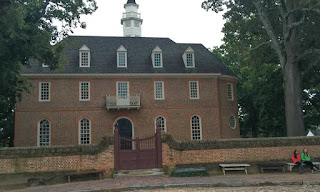Non Speaking Autistics and College
Thanks to everyone who joined us for William
& Mary’s summer weekend neurodiversity course. The course was held the same weekend as the
Washington DC Pride Parade. There was a lot happening at Dupont Circle!
I was thrilled to see a non speaking autistic
person among the attendees. To the best
of my knowledge he was the first such person to attend and take part in our
neurodiversity programming. At one
point, he asked, “When will colleges be ready for students like me?” He was accompanied by an aide (she was beside
him in high school class too) and he communicated through a letter board where
he spelled out his thoughts, and she verbalized them. That’s a somewhat familiar scenario in high
school, but rare in higher education.
I wondered how long it would be (if ever)
before technology could take the place of the aide. It seems like a simple process until you
watch it happen, and realize the aide does far more than add word spacing and
punctuation. She also adds focus, by asking questions and helping clarify
thoughts. I can see a machine solving
the punctuation puzzle, but machine intelligence has a ways to evolve for the
rest.
Replacing that student’s letter board with an
ipad would not eliminate his need for assistance in school. And he was 18 – with college potentially a
year or so away. I told him about
specialized autism programs like the one at Landmark College in Vermont, where
they have aides like the one he brought to class, and a wide range of intensive
support services. That’s one possibility
for college, right now.
The other possibility is to obtain funding for
an aide through state disability services, and have an aide accompany him to a
more traditional (and more affordable) state college. Unfortunately, the availability of services varies
widely across the country.
Digging deeper, I realized the aide is not the
only issue. What about housing, and
general living supports? A non-speaking
person with high support needs cannot simply go off to college like a student
without disability. Once again, we have
the example of specialized colleges like Landmark who have substantial support
abilities, and students can turn to state agencies for help.
This adds up to a substantial restriction on
the college options for a non-speaking person.
If they are registered with disability services in the state where they
live it may be easier to attend school in that state. But what if they want to attend an out of
state school? That may be a lot more
work to set up. And support funding is by no means assured. Private autism-centered schools like Landmark
are an option, but they are few in number and the cost will be prohibitive for
many families.
William & Mary is committed to making a
campus that’s friendly and welcoming to neurodivergent students, but this was a
student we could not accommodate with the college’s resources alone. And I’m sure we are typical of mainstream
colleges in this regard. The truth is,
we’ve had very few requests for this kind of accommodation up till now, but I
am sure they are coming.
How will college admission officers evaluate
applications from non-speaking students?
The desire of colleges to use a standardized writing-intensive
application runs hard up against the desire for neurodiversity accommodation in
students like this, whose disability makes it hard to be expressive in
writing. We owe it to the students of
tomorrow to solve this problem.
We talk about community college as a good path
for autistic students who want a gentler transition to college. Most community college students live at home,
so that transition is delayed. Community
college classes tend to be smaller, and that may be less stressful. Community colleges also tend to be in-state,
so accommodation services may be easier to obtain. Admission processes are far easier, and
tuitions are low. The transition from community college to a regular college is
generally a lot easier than going straight from high school.
Is that – and our existing array of
accommodations - enough to accommodate students like the one in this weekend’s
class? Time will tell.
John Elder Robison is an autistic adult and advocate for people with neurological differences. He's the author of Look Me in the Eye, Be Different, Raising Cubby, and the forthcoming Switched On. He serves on the Interagency Autism Coordinating Committee of the US Dept of Health and Human Services and many other autism-related boards. He's co-founder of the TCS Auto Program (A school for teens with developmental challenges) and he’s the Neurodiversity Scholar in Residence at the College of William & Mary in Williamsburg, Virginia.
The opinions expressed here are his own. There is no warranty expressed or implied. While reading this essay may give you food for thought, actually printing and eating it may make you sick.






Comments
"When will technology take the place of the aide"?
Rosemary Crossley and Chris Borthwick wrote this paper for the Commission of the Future back in the 1990s and it's interesting to look at it in the 2010s.
Chantal Sicile-Kila has the Autism College which has lots of free resources for people to train and learn.
The communication partner is there because the motor is not. While this student had the ability to sit for long periods of time, relatively quite and with little movement, many non-speaking students have little control of the their body and are sometimes a moving target. The technology of simply placing the letter board on a music stand (often recommended by well meaning education systems) is not effective for those who need to move around, have no choice but to follow their body that moves around, or communicate via letter board while stimming.
I am super thrilled to see this reflective blog today! The student and several community members of Growing Kids Therapy Center attended to 1) participate and 2) gauge where the non-speaking student was reflected in Neurodiversity 101 and the course portion about transition to college. We are honored to have joined the conversation and look forward to all that the W&M neurodiversity initiative has to offer all past and future participants. Thank you, thank you John, Karin, Josh and Cheryl!
Thank you for the Gallaudet analogy.
One big problem with stationary/static communication systems is right there, Christine.
I do know someone who is doing the TAP in her college work. She is on the honour roll for first year students. Her graduation is 2017-18 if all goes well.
https://www.facebook.com/The-Ordinary-Life-of-an-Extraordinary-Girl-165047126851472/#
[they're having a great time in Europe!]
[Alex, it's been too long since I read your page, and I forgot you had a Twitter!]
And there's a guy called Seide as well.
Thank you for the mention of the TASH conference and Heidi Brett Mendez's work.
Communication partners need every power to move.
It must have been a great honour for the students involved.
They are "Able to go to college" as recorded and experienced by AZ Chapman ...
who just ...
DID HER LAST FINAL.
AZ's College Journey: ABLE TO GO TO COLLEGE. Click on the numbers or find her YouTube channel
The tag of ABLE TO GO TO COLLEGE if this is more accessible
Looking for Growing Kids Therapy right now. I can wait. And so can the readers of LOOK ME IN THE EYE.
But I wonder if they appreciate how long and with how much pressure relative to the opportunity?
So good to have a community and be in that community.
AGOSCI and ISAAC are other good connections as well as the Pittsburgh Employment Group which had a conference every two years.
I read comments about the overseas situations where potential students are unable to access required support and ponder on how their rights to education are being thwarted.
How good it is to hear about a Queensland university who is doing this.
I knew that Peter Rowe was a great leader for lots of people who are using assisted communication.
[or as you said "physical and interactional support"].
Good to see an active Disabilities Office and that they meet every semester.
Contact hours are important and I am sure the student is putting out distinctive work!
You "ponder on how their rights to education are being thwarted".
Just read about a Central University in India who is now providing waivers to low-income and disabled students.
but hell thats just me.
but hell thats just me.